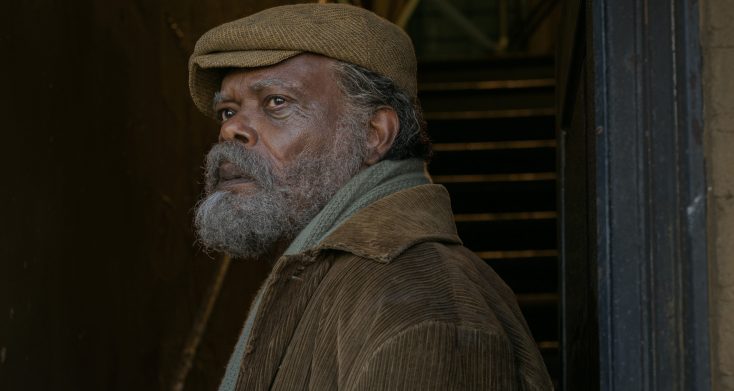
(l-r) Samuel L. Jackson, Dominique Fishback and Walton Goggins in “The Last Days of Ptolemy Grey.” ©Apple TV+. CR: Hopper Stone.
By JUDY SLOANE
Front Row Features
HOLLYWOOD—In 2010, best-selling author Walter Mosley published his acclaimed novel, “The Last Days of Ptolemy Grey.” Now, his adapted screenplay of the book is a new Apple TV+ limited series starring Samuel L. Jackson (“Avengers” franchise, “Glass.”)
The six-episode series tells the story of a 93-year-old (Jackson), consumed by dementia, forgotten by his family, friends and even himself. When he learns of a treatment that can temporarily restore his memories, Ptolemy starts on a journey that reveals shocking truths about his past, present and future.
Jackson and Mosley met virtually with the Television Critics Association to talk about their drama, which has taken years to bring to the screen. It premieres on Apple TV+ Friday March 11, with the first two episodes, followed by one new episode a week.
Q: It seems like this is a unique TV experience for both of you. Walter, where you’re the show runner and Sam, this is your first TV-starring role, and the first TV show, How did it feel to step into this TV space?
Walter Mosley: I’ll start. I don’t know of any show like this one; the idea of just concentrating on having a whole experience around a person who’s experiencing dementia in an episodic television environment—what he goes through, how he responds (and) what he does.
A movie would’ve been too short for this, and it’s not exactly television, either. It’s a kind of a streaming; it’s like an ocean that you embark upon. It was a great deal of fun doing it and it felt very different. Maybe Sam feels differently.
Samuel L. Jackson: No, I don’t feel different about that. The point is, it’s a story about a person who has Alzheimer’s, but it’s a fairytale. Walter created a drug and a person that comes with a cure—in theory—that’s temporary, and it’s not a real thing. So, it’s almost a modern-day fairytale of once-upon-a-time there’s a guy who had Alzheimer’s and he had an opportunity to not have Alzheimer’s for a while, and this is what he did. It helped him rediscover a piece of his life that was very important to him.
It’s a fanciful (tale) that allows people to come up out of the heaviness of the story of who Ptolemy is into the lightness of what his life had been when he had a full, fruitful and lively life. But he deteriorates. He goes back.
Mosley: It’s a fairytale, but a dark fairytale in more ways than one.
Q: Walter, what kind of adjustments did you have to make from the book to the screen?
Mosley: It’s a really hard thing. Books are so different than screenplays and they have to unfold in a different way. When you’re writing fiction, you don’t have to worry so much, because people are reading it, they’re moving through it slowly at their own pace. But you have to make sure that the revelations work for the (TV) audience.
The great thing is that the actors who were involved in the project were so good. They wanted to make it work (and) it actually became easy to change things according to what people needed.
Q: Samuel, was it difficult to do the scenes where Ptolemy is in the grip of Alzheimer’s? Were you able to go in and out of it on the set and not take it home with you at night?
Jackson: I’m not a Method actor. I do all that work before I get to (the set) so that when it’s time for the work to happen, I just flow into it.
It’s something that I’ve been preparing to do for a long time. I’ve seen this series for about 10 years in my head, so when it was time to do those things I just turned on the emotional asset that I’m able to access and do it. Then, when I get off, I talk to my agent on the phone about things that I need to do later on.
Q: Why did you want to play this character so badly?
Jackson: I’m from a family where I felt like I was surrounded by Alzheimer’s; my grandfather, my uncle, my aunt, my mom. I watched them change, deteriorate, and become different people over the years. (We’re) giving an audience an opportunity to know that they aren’t the only people who watch their loved ones deteriorate that way, who need an outlet to look at someone else dealing with those particular things.
Q: You have played some dynamic, memorable and iconic characters. When you reflect on your career, and specifically the performances that have been most transformative for you, where does Ptolemy Grey rank?
Jackson: That’s a difficult question because all the characters that I portray are the most important to me in the moment of doing them; even characters that I repeat. I’m here in London doing (“Avengers” spinoff) “Nick Fury” now. I repeat him a lot so I know who he is and he’s easy to access.
Ptolemy was easy to access because I read the book a lot. Ptolemy fits into the real-life chronology of my life in terms of honoring all those people in my life who had Alzheimer’s. Or every time I walk into a room and I can’t remember why I walked in there, or I can’t remember the name of an actor in this movie (snaps fingers). All those things mean something to me.
It’s an honest and hopefully endearing assessment of the deterioration of life that a lot of us face, feel, in a personal way with someone who’s in our family, or maybe people who feel themselves slipping and need to see and find a way to pull themselves back.





